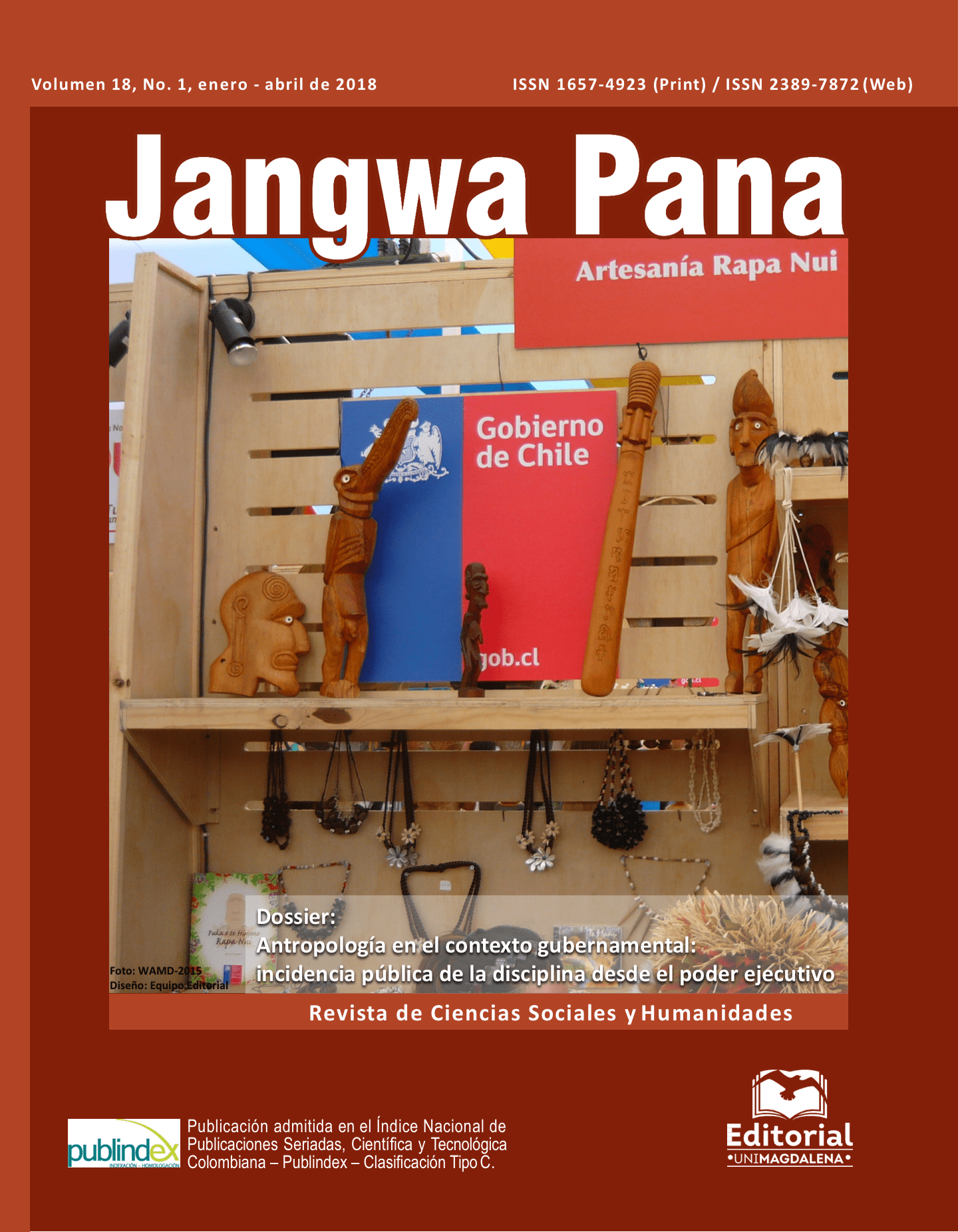To roller skate a file: The 004 bill taskforce at the Indigenous Affairs Direction
Main Article Content
Abstract
Downloads
Article Details
References
Arenas, J. (2016). Sembrando vidas. La persona I'ku y su existencia entre lo visible y lo invisible. Tesis de doctorado en antropología. Universidad de Brasilia, Brasil.
Briones, C. (2007). Escenas del multiculturalismo neoliberal, una proyección desde el Sur. En Cultura y neoliberalismo, editado por Alejandro Grimson. Buenos Aires: CLACSO.
Chaves, M. (2011). Presentación a La multiculturalidad estatalizada: indígenas, afrodescendientes y configuraciones de Estado, editado por Margarita Chaves, 9-24. Bogotá: ICANH.
Caicedo, A. (2015). La alteridad radical que cura. Neochamanismos yajeceros en Colombia. Bogotá, Colombia: Editorial Uniandes.
Correa, F (2006). Interpretaciones antropológicas sobre “lo indígena” en Colombia. Universitas Humanística 62: 15-41.
Correa, F. y Acero, S. (2013). Proyecciones del Instituto Indigenista de Colombia en la División de Asuntos Indígenas. Baukara 3:83-98.
García, H. (2010). Una historia de nuestros otros. Bogotá: Editorial Uniandes.
Grey Postero, N. (2007). Now we are citizens: indigenous politics in postmulticultural Bolivia. Stanford: Stanford University Press.
Hale, C. (2002). Does multiculturalism menace? Governance, cultural rights and the politics of identity in Guatemala. Journal of Latin American Studies 34 (3): 485-524.
Hale, C. (2004). Rethinking indigenous politics in the era of the "Indio permitido”. North American Congress on Latin America 38 (2): 16-21.
Jaramillo, A. (2016). Las palabras del multiculturalismo estatal en Colombia. Los funcionarios y la garantía de derechos de los emberá y nukak. El caso de la salvaguarda y el enfoque diferencial étnico entre los pueblos indígenas emberá y nukak. Tesis de maestría en estudios latinoamericanos. Universidad Nacional de San Martín, Argentina.
Jimeno, M. (2007). Naciocentrismo: tensiones y configuración de estilos en la antropología sociocultural colombiana. Revista Colombiana de Antropología 43: 9-32.
Jimeno, M. (2008). Colombia: citizens and anthropoligists. En A companion to Latin American anthropology, editado por Deborah Poole, 72-90. Malden: Blackwell Publishing.
Jimeno, M. (2011). El lugar de la diferencia cultural: cambios en la definición de nación. Innovación y Ciencia. 18 (4): 36-43.
Langebaek, C. (2009). Los herederos del pasado. Indígenas y pensamiento criollo en Colombia y Venezuela. Bogotá: Editorial Uniandes.
Lemaitre, J. (2009). El derecho como conjuro: fetichismo legal, violencia y movimientos sociales. Bogotá: Universidad de los Andes y Siglo del hombre.
L’ Estoile, B, Neiburg y Sigaud. (2005). Introduction: Anthropology and the Government of “Natives”, a comparative approach. En Empires, Nations and Natives. Anthropology and State-Making, editado por Benoit L’Estoile, Federico Neiburg y Lygia Sigaud, 1-29. Durham: Duke University Press.
Ministerio de Cultura. (2010). Documentos para la historia del movimiviento indígena colombiano contemporáneo. Bogotá: Ministerio de Cultura.
Pacheco de Oliveira, J. (2005). The anthropologist as expert: Brazilian ethnology between Indianism and Indigenism. En Empires, Nations and Natives. Anthropology and State-Making, editado por Benoit L’Estoile, Federico Neiburg y Lygia Sigaud, 223-247. Durham: Duke University Press.
Padilla, G. (1996). La ley y los pueblos indígenas en Colombia. Journal of Latin American Anthropology 1 (2): 78-97.
Pellegrino, V. (2007). Incumplir cumpliendo: una etnografía al papeleo del Auto 004. Tesis de doctorado en antropología. Universidad de los Andes.
Pels, P. (1999). Profession of duplexity: a prehistory of ethical codes. Current Anthropology 40(2): 101-136.
Pérez, M. (2007). Las perspectivas y retos de la antropología aplicada en el siglo XXI. Revista Mad 16: 1-9.
Pineda, R. (1997). La Constitución de 1991 y la perspectiva del multiculturalismo en Colombia. Alteridades 7(14): 107-129.
Pineda, R. (2005). La enseñanza de la antropología en Colombia. Universitas Humanística (59) 11-21.
Ramos, AR. (2011). Indigenismo: um orientalismo latinoamericano. Anuário antropológico 2011-I, 2012: 27-48.
Rappaport, J. (2008). Utopías interculturales públicos, experimentos con la cultura y pluralismo étnico en Colombia. Bogotá, Colombia: Universidad del Rosario y Universidad del Cauca.
Rose, N. (1997). El gobierno en las democracias liberales “avanzadas”: del liberalismo al neoliberalismo. Archipiélago 29: 25-40.
Sarrazin, JP. (2012). New Age en Colombia y la búsqueda de la espiritualidad indígena. Revista colombiana de antropología 48 (2):139-162.
Sarrazin, JP. (2015). Representaciones sobre lo indígena y su vínculo con tendencias culturales globalizadas. Anagramas 14 (27): 163-184.
Uribe, C. (2002). El yajé como sistema emergente: discusiones y controversias. Documentos CESO 1 (33), pp. 1-65.
Vasco, LG. (2002). Entre selva y páramo. Viviendo y pensando la lucha india. Bogotá, Colombia: ICANH.

